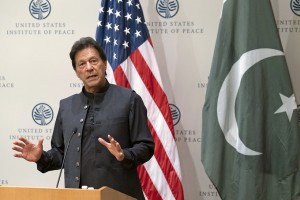Emerging Trends in Strategic Arena and Pakistan
20 Main Recommendations
- The coronavirus pandemic will out of necessity give rise to a new world order based on the review of policies and strategies, and reorientation of survival concepts and doctrines. Pakistan cannot afford to remain oblivious to this transformation and will have to align itself with the altering world and swiftly change the business-as-usual model to business for the future.
- COVID-19 is a non-state actor. Irrespective of its origins – whether man-made or natural, we can expect recurring episodes in the future. Hence, Pakistan needs to learn from the experiences of and response potential of other nations and formulate strategies according to its own environment and resources.
- Health care, cure and preservation of human life should be prioritized as part of new health strategies with intensive budgetary allocations. Apart from health care facilities, research centres, indigenization of medicines and electro-medical equipment, along with naturalization of medical facilities should be the strategic undertakings of any new health framework. This is currently the top priority of countries across the world and Pakistan should be no different.
- Pakistan must be well-equipped to detect and stop such threats in their infancy. For this purpose, the National Disaster Management Authority (NDMA) should be made more potent and broad-based.
- Large administrative units such as provinces are not very viable, active or responsive in dealing with such crises. Hence smaller units or administrative pockets with practical and a targeted approach should be preferred.
- There should be a blend of technocrats, experts, politicians and bureaucrats to manage the situation so that a single decision-making body does not prevail during such crisis
- On the tactical side, demographic surveys should be conducted to determine strategies for the social sectors, urban and rural planning, administrative arrangements and crisis management at both the micro and macro levels.
- Threat profiling should be conducted to devise strategies for targeted approach and disaster management and resource allocation.
- The industrial base should be reoriented so that the industries could be adaptable and serve dual or triple purposes. This would entail making it technically viable to switch their output from one production to another according to the need of the time such as the current pandemic.
- Making use of the barren lands and deserts for agriculture and the agro-based industry should be expanded for food security processing and preservation.
- Pakistan’s orientation should now move towards a welfare instead of a security state. This is because the facets of war have changed a lot in the form of cyber, hybrid and propaganda wars.
- Security dynamics are changing from the physical and ideological to the subtler, soft and porous frontiers of hybrid, microbiological and human chain reactions. It would be a folly if the country does not prepare for attacks from this dimension.
- Unless there is threat perception, the government will not be able to create proper response potential and gain the required tools to neutralize such threats. At the same time, the country has to evolve strategies so that it would have policy options when faced with such threats.
- Future strategies and doctrines will be reshaped to fight short, intense and multi-directional limited wars for which smart, agile and small armies would be required. These will not require huge logistics stamina and so defense spending will automatically be reduced.
- Pakistan’s strategic direction should be of unconventional deterrence for war avoidance. This deterrence should be forward poised and should be anchored in positioning obstacles along the borders, especially with India, rather than men and tools of war. This will also force India to hike its military spending to counter the obstacle-based and multiple defensive lines.
- Incorporating a high-tech, agile and small standing army with skill-based reserves for fighting calamities such as coronavirus is the need of the hour.

- A global regime under UN auspices should be set up so that countries could jointly counter the pandemic in an effective and forceful manner.
- The country which invests more in research, protective measures, human tools and expertise against coronavirus will be able to survive in any future crisis.
- A major human violation and tragedy is happening in India and Israel in the form of Muslim-centric lockdowns. Pakistan should develop a proper narrative to highlight the lockdown in Kashmir and show its various facets to the world.
- India might engage in some misadventure because a limited war is an option for that country.
This piece is based on a lecture delivered by Security analyst Brigadier (retd) Said Nazeer Mohmand during an IPS webinar on ‘Emerging Trends in Strategic Arena and Pakistan’.
 Jahangir's World Times First Comprehensive Magazine for students/teachers of competitive exams and general readers as well.
Jahangir's World Times First Comprehensive Magazine for students/teachers of competitive exams and general readers as well.


